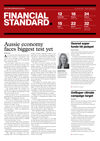Investors progress on climate, but barriers emergeBY JAMIE WILLIAMSON | FRIDAY, 4 APR 2025 8:09AMA growing number of local investors are making progress on climate despite the anti-ESG sentiment simmering offshore. A fresh report from the Investor Group on Climate Change (IGCC) found 65 of Australia's super funds, fund managers, and retail funds have made progress across five of six key indicators. Some 78% of investors have a net zero target, while 86% now have a climate policy. About 76% make climate disclosures, 81% are assessing for physical risks, and 60% are responsible to physical risks. All of these indicators rose between 2% and 31% in 2025 compared to 2024. Interestingly, between 2021 and 2024 the number of investors responding to physical risk stagnated between 26% and 29% before shooting up to 60% in 2025. The only indicator that didn't rise was the number of investors with a climate action plan, however IGCC said that was likely due to new minimum regulator standards for transition plans. Investors are also showing increased interest in climate solutions as investments. About 63% were interested in investing in renewable energy in 2024 versus 47% in 2023. Forty-six percent are interested in low carbon transport compared to 32% last year. The biggest jumps were seen in green infrastructure, which jumped from 22% to 51% in 2024, and energy storage, which jumped from 32% to 58% in 2024. That said, IGCC said there's been an uptick in barriers to investing in climate solutions being reported. There was a 13 percentage point jump in people reporting 'lack of opportunities with appropriate risk/return profiles', as well as 'lack of government incentives.' Meanwhile, there was a four percentage point increase in those citing policy uncertainty. The Your Future, Your Super legislation was also cited by 35% of investors as a barrier, as was lack of opportunities with appropriate risk return. "The Australian investment industry remains focused on the long-term economics; progress on climate is absolutely critical to their beneficiaries' financial interests, which is an investor's fiduciary duty. Investors continue to set emissions targets and are spending a lot more time figuring out how to protect against increasing climate damage," IGCC chief executive Rebecca Mikula Wright said. "As a result, they're hungry for attractive opportunities across renewables, battery storage, green infrastructure and transport, and even nature-based solutions. "But it's a mixed picture in the shorter term: the risk/return outlook for local climate solutions has slipped slightly, and increased policy certainty would help give investors the confidence to deploy funds into Australian growth industries." Meantime, Till Jung, global head of ESG at ISS STOXX, the report's sponsor, said the findings should help the market cut through the noise and understand how investors are engaging in the transition. "The data on investors' commitments, tools, analysis techniques, and stewardship practices really shows how they're going to achieve the outcomes that will ultimately protect beneficiaries' returns from the impacts of climate change," Jung said. Related News |

QIC has completed a $370 million equity raise and $1.6 billion debt refinancing for Pacific Energy Group (PEG) for a contracted capacity of 946 megawatts (MW) across 48 sites.
Australia could eventually export $400 billion in green iron, but new research demonstrates there are significant market and policy failings standing in the way.
Raf Wood, co-managing director of Silva Capital, discusses the evolution of Australia's carbon market and Silva's latest update on their carbon credit projects.
Natixis Investment Managers will combine two of its affiliates, Mirova and Thematics Asset Management.

















